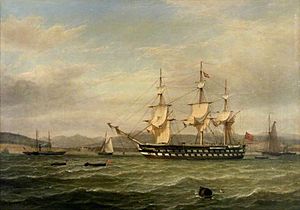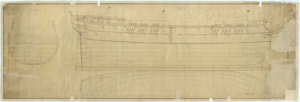HMS La Hogue facts for kids

Hogue
|
|
Quick facts for kids History |
|
|---|---|
| Name | HMS La Hogue |
| Ordered | 1 October 1806 |
| Builder | Deptford Dockyard |
| Laid down | April 1808 |
| Launched | 3 October 1811 |
| Fate | Broken up, 1865 |
| General characteristics | |
| Class and type | Vengeur-class ship of the line |
| Tons burthen | 1750 bm |
| Length | 176 ft (54 m) (gundeck) |
| Beam | 47 ft 6 in (14.48 m) |
| Depth of hold | 21 ft (6.4 m) |
| Propulsion | Sails |
| Sail plan | Full-rigged ship |
| Armament |
|
HMS La Hogue was a powerful warship of the British Royal Navy. It was a "ship of the line," meaning it was big enough and strong enough to fight in the main battle line of a fleet. Launched on October 3, 1811, at Deptford Dockyard, this ship had 74 guns. It was named after the famous Battle of La Hogue from 1692. The front of La Hogue had a cool design: a green and chocolate lion with a grinning mouth, white teeth, and a huge red tongue!
Contents
The Story of HMS La Hogue
Early Adventures in the War of 1812
HMS La Hogue was very active during the War of 1812 between Britain and the United States. In May 1813, while under the command of Captain Thomas Bladen Capel, it recaptured a ship called Ann. The Ann was a packet ship, carrying mail and passengers, and had been captured by an American privateer named Yorktown.
However, the American privateer Young Teazer captured Ann again shortly after. La Hogue then successfully trapped Young Teazer off the coast of Nova Scotia.
On August 16, 1813, La Hogue also captured a Portuguese ship named Flor de Mar. Later that year, on November 12, 1813, a big storm drove La Hogue ashore in Halifax, Nova Scotia. Luckily, it was refloated, repaired, and returned to duty.
Brave Boat Service and the Bates Sisters
In April 1814, boats from La Hogue and other British ships attacked Pettipague point. This was a successful raid, and the officers involved, including Lieutenant Pyne from La Hogue, were promoted for their bravery. Years later, in 1847, a special medal was given to those who survived this action.
In September 1814, La Hogue anchored near the Scituate Lighthouse in Massachusetts. The crew planned to send a raiding party into the nearby town. But two brave sisters, Rebecca and Abigail Bates, who were the lighthouse keeper's daughters, stopped the attack. They played a drum and a fife that had been left at the station. The British sailors heard the music and thought it was the town's militia approaching, so they gave up their plan!
Later Years and Steam Power
In 1850, La Hogue was changed into a modern steamship. It was given a screw propeller, which was a big upgrade from just using sails.
From 1852, it served as a guard-ship at Devonport under Captain William Ramsay. Its final service was in the Baltic Sea during the Crimean War. On September 18, 1855, it ran aground off Renskär, Sweden, and was badly damaged. Three smaller gunboats helped to refloat it after some of its heavy guns were removed.
HMS La Hogue was eventually taken apart, or "broken up," in 1865.
 | James Van Der Zee |
 | Alma Thomas |
 | Ellis Wilson |
 | Margaret Taylor-Burroughs |


